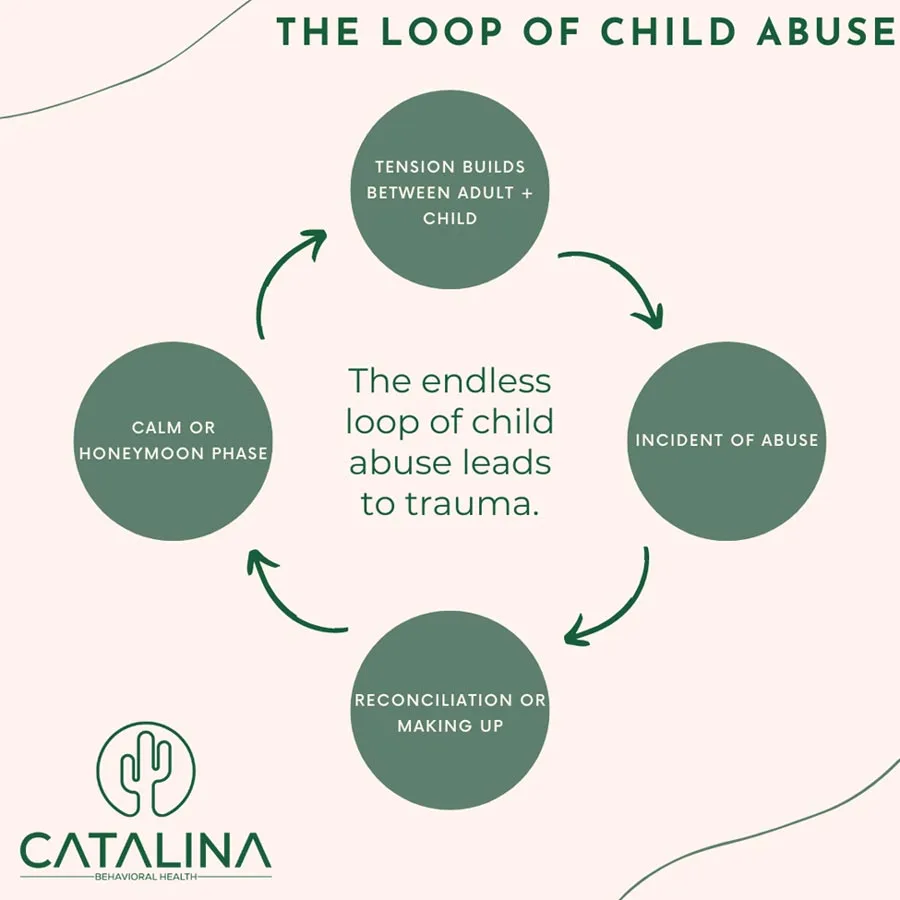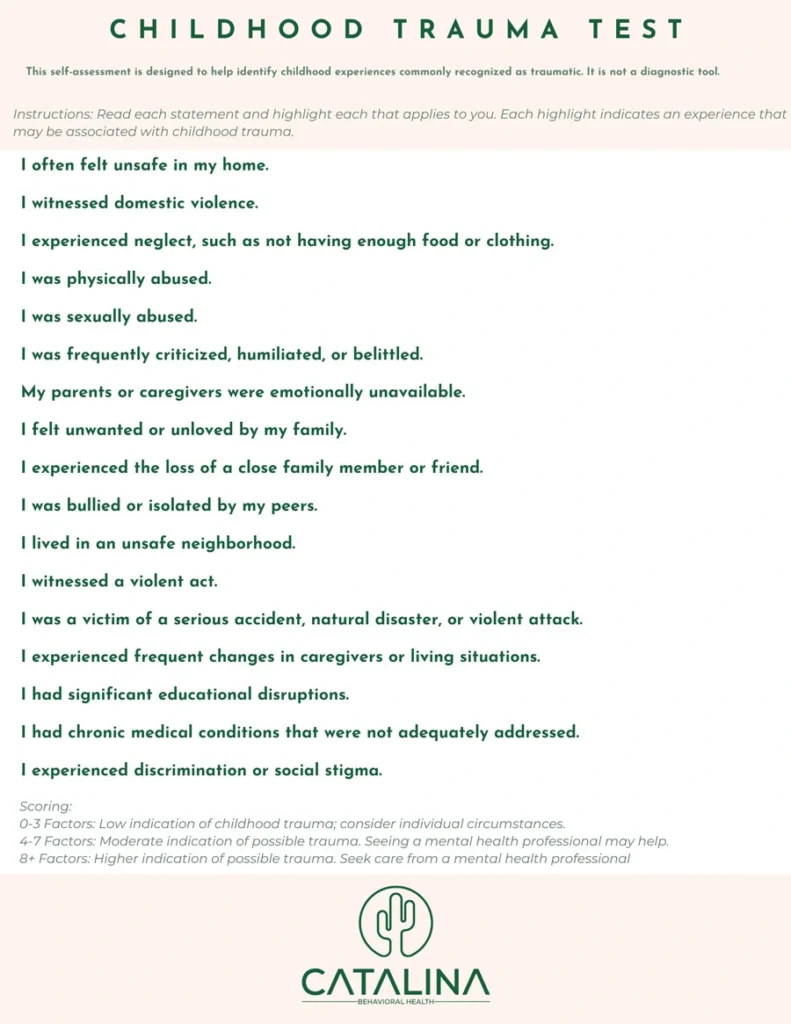Gain Insights into Childhood Trauma with Our Self-Assessment
Did you experience adverse childhood experiences that you carried into your adult life? Children who suffer abuse, neglect, or other trauma often have mental and physical health problems that linger, seeping into every part of their lives as adults.
Our free Childhood Trauma Test can be a powerful tool, helping you recognize that you need professional support.
Catalina Behavioral Health understands the negative effects that adverse childhood experiences (ACEs) can have on individuals who have survived trauma. We’ve helped countless clients learn to learn different types of coping strategies to live with the memories of past events.
Please keep reading to learn about our ACES test, a questionnaire that helps people explore their feelings about the event. Once they understand their relationship with the trauma, we sincerely hope each person who needs help will speak with a mental health professional who specializes in trauma-informed treatment.
Mental and Physical Health Consequences of Adverse Childhood Experiences

Those who had adverse experiences as a developing child often struggle with the fallout until they get help. Here are some of the potential outcomes:
Examples of Mental Health Issues Related to Childhood Traumatic Events
Childhood trauma means an increased risk for mental illness:
- Depression: ACEs can lead to mood disorders or depression. These come from prolonged stress and emotional trauma.
- Anxiety Disorders: Early trauma can cause anxiety, panic disorder, and phobias.
- Post-Traumatic Stress Disorder: Childhood can trigger PTSD. They might have intense, disturbing thoughts and feelings related to their experiences.
- Complex PTSD (CPTSD): CPTSD can develop in children who survived repeated incidents of abuse. They may grow up having difficulties with emotional regulation, self-identity issues, and toxic stress.
- Substance Use Disorders: ACEs increase the risk of developing substance abuse problems; some survivors turn to alcohol or drugs to cope with the memories.
- Personality Disorders: Personality disorders may develop from abandonment by one or more parents in childhood. These people often grow up having unstable relationships and low self-esteem.
- Dissociative Disorders: Severe traumatic experiences in childhood can lead to dissociative disorders, a disconnection from reality.
The harm that ACEs can create reveals an urgent need for early intervention and support.
Confidential Trauma and PTSD Assessment
Are There Physical Impacts from Childhood Trauma? 4 Possible Conditions
Yes, Adverse Childhood Experiences (ACEs) can also lead to significant physical health outcomes. Some are often short-term and disappear after a child leaves home, while others can occur throughout the child’s lifetime.
Here are four health concerns associated with high ACE scores:
- Chronic Health Conditions: Individuals with a high number of ACEs are at greater risk for developing chronic conditions such as heart disease, diabetes, obesity, and asthma.
- Impaired Immune System: Prolonged stress due to ACEs can weaken the immune system, making people more susceptible to frequent infections and autoimmune diseases.
- Gastrointestinal Problems: Stress and trauma can affect the gastrointestinal system. Some struggle with conditions like irritable bowel syndrome (IBS) and gastritis.
- Neurological Development Issues: Chronic stress from ACEs during key developmental periods can impact brain development. That might cause cognitive impairments and attention or memory problems.
If You Experienced These, You May Want to Try the Childhood Trauma Quiz

A quiz or other self-assessment materials, whether in looking for repressed memories, or childhood trauma, can be great resources for self-reflection. Our childhood trauma test has been developed based on our vast experience. Do any of the following sound familiar to you?
Physical Abuse or Physical Neglect
Physical abuse leads to immediate physical injuries and possibly long-term health problems. Kicking, hitting, biting, or burning a child can do damage externally and internally when severe.
Physical neglect happens when parents don’t provide a child with basic needs. It means lacking food, clothing, shelter, and care for injuries or illnesses. This form of neglect can lead to serious health and developmental issues. Think malnutrition and untreated illnesses.
Sexual Abuse and Childhood Trauma
Sexual abuse often results in profound emotional and psychological trauma. It can often lead to the child experiencing a lack of trust in others and sexual dysfunction later in life.
Verbal Abuse
Verbal abuse can damage a child’s self-esteem. It can also lead to a roller coaster of emotions and behavioral issues, such as anxiety.
Other Family Members with Childhood Trauma
The most basic function of every parent is to protect a child from childhood trauma. But for parents who have received a professional diagnosis related to trauma, that’s no small feat.
Children with a family member with trauma may encounter secondary trauma, perhaps even perpetuating a cycle of neglect in the next generation. This can lower their emotional development and ability to form healthy relationships.
Emotional Abuse or Emotional Neglect
Research has linked emotional neglect to feelings of worthlessness and insecurity. The impacted person might also struggle to develop empathy.
Parents Participating in Domestic Violence
Growing up in a home rife with domestic altercations creates instability and fear. Children exposed to this violence are at higher risk of developing emotional and behavioral problems.
Witnessing Traumatic Events
Exposure to damaging weather events, war, or tragic accidents can be deeply harmful to children. Such experiences cause fears and anxieties that can disrupt an ability to cope with stress.
The information listed here is only a partial list. There are many other forms of trauma that can have lasting effects on a child.
Our Childhood Trauma Test: What’s Your ACEs Score?

The Childhood Trauma Test we are sharing contains a list of behaviors or conditions associated with childhood trauma. You will highlight each incident you have experienced in your life. A low ACE score means there’s a lower chance you carry trauma; a high score elevates your risk factor.
This childhood trauma quiz is not a diagnostic tool. Instead, it is a helpful guide to self-reflection for anyone concerned about the impact of unresolved trauma on their mental or physical health.
Childhood Trauma Quiz for Adults
- I often felt unsafe in my home.
- I witnessed domestic violence.
- I experienced neglect, such as not having enough food or clothing.
- I was physically abused.
- I was sexually abused.
- I was frequently criticized, humiliated, or belittled.
- My parents or caregivers were emotionally unavailable.
- I felt unwanted or unloved by my family.
- I experienced the loss of a close family member or friend.
- I was bullied or isolated by my peers.
- I lived in an unsafe neighborhood. I witnessed a violent act.
- I was a victim of a serious accident, natural disaster, or violent attack.
- I experienced frequent changes in caregivers or living situations. I had significant educational disruptions.
- I had chronic medical conditions that were not adequately addressed.
- I experienced discrimination or social stigma.
Download your free ACE quiz PDF and take it. It will help you determine whether you need to seek additional information, educational resources, or professional care.
How is Childhood Trauma Measured on Your Adverse Childhood Experiences Test?
Count up how many factors you highlighted on the ACE test. Here’s the scoring key:
- 0-3 Factors: Low indication of childhood trauma; consider individual circumstances.
- 4-7 Factors: Moderate indication of possible trauma. Seeing a mental health professional may help.
- 8+ Factors: Higher indication of possible trauma. Seek care from a mental health professional.
Even if you have a low number on this quiz, be sure to reach out for mental health support if you are struggling with mental or behavioral issues.
Get Effective Trauma Treatment Options – Reach Out Now!
Catalina Behavioral Health Takes a Holistic Approach to Healing Trauma
Any ACE study you read will show clear interconnections between childhood trauma and certain life events.
Take our past client, Sari, as an example. Sari’s relationship with her parent was complex. During college, her father constantly pressured her to get top grades. He also withheld approval or threatened to stop paying her tuition for low test scores. Sari felt inadequate and started to get into trouble, hanging out with peers who accepted her at face value. Unfortunately, they partied often and even found trouble with the law. As her grades slipped, Sari, too, started using drugs with her friends.
Sari’s mental health declined. She knew her parent would be furious, but she had to come clean with him about the downward spiral of mental health and the dabbling with drugs and drinking. Sari spent summer break in our Intensive Outpatient Program. She discovered that her father’s manipulations went back to early childhood.
Our team helped her learn to cope with the trauma. She and her father also attended family therapy, and it was helpful for her father to learn his role in Sari’s predicament. It turned out that he had a family member diagnosed with trauma, and he had perpetuated the cycle unknowingly.
Today, Sari is finishing her degree, and changing majors to become a trauma therapist.
Effective Therapies for Better Mental Health and Healing Childhood Trauma

Every adult wears their childhood trauma differently. Some children have greater natural resilience and learn to cope despite their upbringing. However, others struggle with mental health from childhood into adulthood; they’re undeniably linked.
Here are some ways we can help clients deal with their childhood trauma in our residential or outpatient setting:
Trauma-Focused Cognitive Behavioral Therapy (TF-CBT)
Skilled psychotherapists using this therapeutic approach help clients understand how their emotions and past experiences affect their behaviors. The therapist teaches the client to reframe negative thoughts and responses into positive ones.
Those interested in additional support in this regard are invited to review our worksheets for adults using TF CBT concepts to review and informally assess your trauma and current coping strategies. This can help you and your loved ones determine if additional professional support is needed.
Eye Movement Desensitization and Reprocessing (EMDR)
EMDR is a somewhat novel technique. Research shows that it is especially effective if the person struggles with both childhood trauma and addiction to alcohol or drugs.
With this form of therapy for childhood trauma or other precipitating events, the client recalls the trauma while receiving another sensory input, such as side-to-side eye movements or hand tapping. Thus, it distracts from the childhood trauma when the person thinks about it in the future.
Up To 100% of Rehab Costs Covered By Insurance
Dual Diagnosis Treatment for All Mental Health Concerns
Childhood trauma usually means the person has a secondary issue, such as mental illness, drug addiction, or alcohol abuse. One or more diagnoses is a dual diagnosis. We treat each disorder along with providing help to heal the childhood trauma to ensure a long-lasting recovery.
Get Proven Help with Childhood Trauma at Catalina Today
If your ACES test suggests you need support for the aftermath of childhood trauma, please reach out to Catalina today. While the quiz is a good starting point, we can provide you with a thorough evaluation and help you heal from the trauma.
Contact us now, or make the call directly for a confidential consultation, you can receive help as early as tomorrow.





